- Updates
- News

Industry professionals discuss new development paths for the restaurant industry.
Reporter: Wang Yujing, Qiu Yongfa
Correspondent: Li Jia
Text/Photos
On October 14th, the sixth edition of the "Zayton Food Talk" culinary salon took place at Huaguang Vocational College in Quanzhou. The event, themed "Industry-Education Integration: Nourishing the Future," was organized by the Quanzhou World Culinary City Office and the Quanzhou Bureau of Commerce. It brought together government officials, academic experts, and restaurant industry representatives to discuss innovative approaches to food education and strengthen the cultural and talent foundations of Quanzhou's food industry.
Addressing Industry Pain Points: A 400 Billion RMB Market Calling for "Cultural + Skill" Talent
Quanzhou's restaurant industry has an annual output value exceeding 400 billion RMB. However, the food education sector is still heavily focused on culinary techniques, with less emphasis on the cultural aspects of cuisine.
To address this imbalance, attendees discussed how to break the existing limitations and enhance the synergy between talent development and industry needs. They emphasized the urgent need for a shift from mere "skill-based" education to nurturing talent who can understand the cultural significance of food and effectively share the stories of Quanzhou's cuisine.
On the same day, He Yibin, Executive Deputy Director of the Quanzhou World Culinary City Office and Head of the Cultural and Historical Talent Group, shared the strategic importance of "food education for Quanzhou's industrial upgrade and cultural inheritance." He stated that Quanzhou's culinary industry-education integration community should not only be a talent training platform but also a research center for Quanzhou's culinary culture.
A Growing Effort in Education: A New Model for Culinary Talent Development
The event highlighted the efforts of local institutions, including Huaguang Vocational College, to improve culinary talent cultivation. The college's Culinary Industry Academy, which opened in March of this year, has already attracted over 100 students nationwide by promoting a collaborative "school-business synergy" model. This initiative aims to cultivate new talent that is not only technically skilled but also culturally aware, with a deep understanding of regional food traditions.
The founder of Huaguang Vocational College, Wu Qicui, shared his vision to build a "Huangpu Military Academy of Fujian Cuisine" through industry-education integration. The goal is to supply the local food industry with professionals who possess both skill and artistry, helping to promote "The Taste of Quanzhou" on a global scale.
Building a Collaborative Industry-Education Ecosystem
Government officials, academics, and business leaders engaged in in-depth discussions on how to build a long-term, effective industry-education integration mechanism. Several key points emerged from these talks.
Zheng Qiang, Deputy Director of Quanzhou's Bureau of Human Resources and Social Security, proposed aligning vocational training programs more closely with the needs of businesses, incorporating food culture courses into the chef certification system.
Professor Wang Jingqiang from the School of Tourism at Huaqiao University suggested the establishment of a "Quanzhou Food Culture Research Center" to integrate academic resources and industry experience. This center would be dedicated to systematically exploring the history, origin, and cultural traits of Quanzhou's cuisine.
Industry representatives also voiced more specific needs. Cheng Zigui, HR Director at Green Island Group, emphasized that businesses not only need chefs who can cook but also those who can design creative dishes that reflect local festivals and cultural characteristics. Liu Shuwen, President of the Quanzhou Restaurant and Culinary Industry Association, proposed creating a collaborative platform between businesses and educational institutions to enable seamless talent employment through a model of "company orders + school training."
Veteran Chinese culinary master Cheng Zhenfang echoed the importance of a deep and systemic approach to industry-education integration. He stressed that this collaboration is not simply about internships but about creating a mutually supportive ecosystem that nurtures high-quality talent, drives industry innovation, and supports long-term growth. "Food education should teach students why they cook," Cheng said, advocating for mentorship programs and skill exhibitions to help young chefs understand the cultural essence behind Quanzhou's culinary traditions.
Advancing Culinary Education: From Skill to Culture
During the event, a joint initiative was proposed to establish a "Quanzhou Culinary Industry-education Integration Community." This platform will not only focus on talent development but will also become a central hub for researching and promoting Quanzhou's food culture. Planned research topics include "Rural Food Customs" and "Silk Road Culinary Cultural Exchange," aiming to shift Quanzhou's culinary education from simply teaching skills to emphasizing cultural preservation and innovation.
Quanzhou is not just seeking to refine its cuisine, but also to use food as a cultural touchstone that connects people through shared food memories, affirming the city's cultural identity. The salon marked a new stage in the development of Quanzhou's culinary education, emphasizing a deeper industry-education integration and empowering the food industry through culture. This approach is set to inject lasting momentum into the high-quality growth of the restaurant industry in the region.
